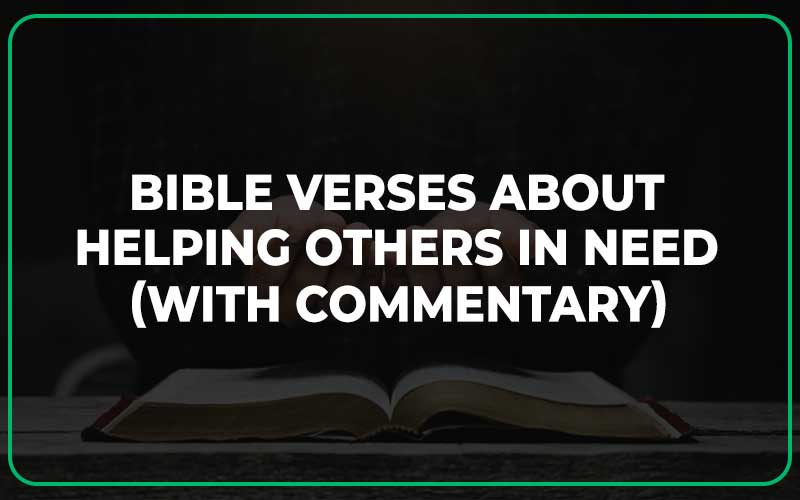The Bible is a great source of inspiration and guidance when it comes to how we should treat and help others.
Today, we will explore some powerful bible verses that highlight the importance of helping those in need.
These verses remind us to have a compassionate heart, to be willing to lend a helping hand, and to show love and care for those who are less fortunate.
Let’s dive in and discover the words of wisdom from the Bible on this fundamental aspect of humanity – helping others in need.
Also Read: 20 Important Bible Verses About Serving Others (With Commentary)
Bible Verses About Helping Others in Need
Proverbs 19:17
Whoever is generous to the poor lends to the Lord, and he will repay him for his deed.
This verse emphasizes the importance of helping those in need, especially the poor. When we show generosity to the less fortunate, we are lending to the Lord Himself. God promises to repay us for our deeds, showing that our acts of kindness and compassion have eternal significance.
Matthew 25:35-36
For I was hungry and you gave me something to eat, I was thirsty and you gave me something to drink, I was a stranger and you invited me in, I needed clothes and you clothed me, I was sick and you looked after me, I was in prison and you came to visit me.
In this verse, Jesus describes acts of kindness towards those in need as acts done unto Him. When we provide food, drink, clothing, care, or visitation to those who are suffering or marginalized, we are fulfilling His command to love our neighbor as ourselves.
Galatians 6:2
Bear one another’s burdens, and so fulfill the law of Christ.
As followers of Christ, we are called to carry each other’s burdens. It is through these acts of love and support that we fulfill the law of Christ, which is to love one another sacrificially.
Luke 10:30-37
Jesus replied, “A man was going down from Jerusalem to Jericho when he was attacked by robbers. They stripped him of his clothes, beat him and went away, leaving him half dead. A priest happened to be going down the same road, and when he saw the man, he passed by on the other side. So too, a Levite, when he came to the place and saw him, passed by on the other side. But a Samaritan, as he traveled, came where the man was; and when he saw him, he took pity on him. He went to him and bandaged his wounds, pouring on oil and wine. Then he put the man on his own donkey, brought him to an inn and took care of him. The next day he took out two denarii and gave them to the innkeeper. ‘Look after him,’ he said, ‘and when I return, I will reimburse you for any extra expense you may have.’ Which of these three do you think was a neighbor to the man who fell into the hands of robbers?” The expert in the law replied, “The one who had mercy on him.” Jesus told him, “Go and do likewise.”
In the parable of the Good Samaritan, Jesus teaches the importance of showing compassion towards others, especially those in need. The Samaritan exemplified true love by going out of his way to care for the wounded man. Jesus commands us to imitate this example and extend mercy to those we encounter.
James 2:14-17
What good is it, my brothers and sisters, if someone claims to have faith but has no deeds? Can such faith save them? Suppose a brother or a sister is without clothes and daily food. If one of you says to them, “Go in peace; keep warm and well fed,” but does nothing about their physical needs, what good is it? In the same way, faith by itself, if it is not accompanied by action, is dead.
James highlights the importance of putting our faith into action. Mere words of compassion without corresponding deeds are meaningless. Genuine faith should be reflected in our willingness to meet the practical needs of others.
Proverbs 14:21
Whoever despises his neighbor is a sinner, but blessed is he who is generous to the poor.
This verse reminds us that despising or neglecting our neighbor, particularly the poor, is considered a sinful attitude. On the contrary, blessing comes to those who show generosity and kindness towards those in need.
Hebrews 13:16
And do not forget to do good and to share with others, for with such sacrifices God is pleased.
The author of Hebrews encourages believers to actively engage in doing good and sharing with others. When we sacrificially serve and share what we have with those in need, it brings pleasure to God.
Psalm 41:1
Blessed are those who have regard for the weak; the Lord delivers them in times of trouble.
This verse highlights the blessings that come to those who show compassion and care for the weak and vulnerable. The Lord promises to deliver and provide for those who prioritize helping others in need.
1 John 3:17-18
If anyone has material possessions and sees a brother or sister in need but has no pity on them, how can the love of God be in that person? Dear children, let us not love with words or speech but with actions and in truth.
This passage emphasizes the importance of not just saying we love others, but demonstrating it through our actions. When someone in need comes across our path, we are called to show both practical and genuine love.

Proverbs 22:9
The generous will themselves be blessed, for they share their food with the poor.
Generosity towards the poor is rewarded with blessings from the Lord. When we willingly share our resources, especially with those who lack, we position ourselves to receive God’s favor and provision.
Romans 12:13
Share with the Lord’s people who are in need. Practice hospitality.
This verse instructs believers to actively share with fellow believers who are in need. It also encourages the practice of hospitality, which extends kindness and provision to strangers as a way of imitating Christ’s example.
Deuteronomy 15:11
There will always be poor people in the land. Therefore, I command you to be openhanded toward your fellow Israelites who are poor and needy in your land.
Even though poverty may persist, God commands His people to be openhanded and generous towards their fellow Israelites who are poor and in need. This establishes an attitude of compassion and solidarity within the community of believers.
Luke 3:11
John answered, “Anyone who has two shirts should share with the one who has none, and anyone who has food should do the same.”
John the Baptist, in response to the crowds who asked how they should live a godly life, instructed them to share their resources with those who lacked. This teaching demonstrates the core value of assisting others in need.
Proverbs 28:27
Those who give to the poor will lack nothing, but those who close their eyes to them receive many curses.
This verse highlights the rewards and consequences associated with our treatment of the poor. Those who give to the poor will lack nothing, whereas those who ignore or neglect the poor bring curses upon themselves.
Isaiah 58:10
And if you spend yourselves in behalf of the hungry and satisfy the needs of the oppressed, then your light will rise in the darkness, and your night will become like the noonday.
God promises that if we devote ourselves to helping the hungry and meeting the needs of the oppressed, our light will shine even in the midst of darkness. Selfless acts of mercy and justice bring about transformation and blessing.
Acts 20:35
In everything I did, I showed you that by this kind of hard work we must help the weak, remembering the words the Lord Jesus himself said: ‘It is more blessed to give than to receive.’
Paul reminds the believers in Acts that they are called to work hard and help the weak. He echoes the teaching of Jesus, emphasizing the blessedness of giving over receiving. Our generosity reflects the heart of Christ.
Proverbs 11:25
A generous person will prosper; whoever refreshes others will be refreshed.
Generosity brings prosperity and blessings not only to the recipient but also to the giver. This verse assures us that when we refresh others through acts of kindness, we ourselves will receive refreshment.
Psalm 82:3-4
Defend the weak and the fatherless; uphold the cause of the poor and the oppressed. Rescue the weak and the needy; deliver them from the hand of the wicked.
This passage encourages believers to advocate for the weak, the fatherless, the poor, and the oppressed. We are called to actively participate in acts of rescue and deliverance, standing against the wicked who seek to oppress others.
Proverbs 31:8-9
Speak up for those who cannot speak for themselves, for the rights of all who are destitute. Speak up and judge fairly; defend the rights of the poor and needy.
The virtuous woman described in Proverbs is portrayed as someone who advocates for those who cannot advocate for themselves. We are reminded of our responsibility to speak up, judge fairly, and defend the rights of the poor and vulnerable.
Matthew 5:42
Give to the one who asks you, and do not turn away from the one who wants to borrow from you.
Jesus tells His disciples to give to those who ask and to not refuse those who want to borrow. This command challenges our selfish tendencies and prompts us to be generous and willing to help whenever the opportunity arises.
Mark 9:41
Truly I tell you, anyone who gives you a cup of water in my name because you belong to the Messiah will certainly not lose their reward.
Jesus teaches that even the smallest act of kindness, such as giving a cup of water to someone in His name, will not go without reward. This encourages us to render assistance in His name, trusting in the eternal value of our actions.
Philemon 1:6
I pray that your partnership with us in the faith may be effective in deepening your understanding of every good thing we share for the sake of Christ.
Paul expresses his desire for Philemon’s partnership in faith to be effective in deepening his understanding of the good things they share for the sake of Christ. Our collaboration and acts of kindness towards others contribute to our spiritual growth and the expansion of God’s kingdom.

2 Corinthians 9:6
Remember this: Whoever sows sparingly will also reap sparingly, and whoever sows generously will also reap generously.
This verse emphasizes the principle of sowing and reaping. If we sow sparingly in our acts of compassion and generosity, we will also reap sparingly. However, if we sow generously, we can expect to reap generously from the Lord’s abundance.
Luke 6:38
Give, and it will be given to you. A good measure, pressed down, shaken together and running over, will be poured into your lap. For with the measure you use, it will be measured to you.
Jesus teaches the principle of reaping what we sow, promising that when we give, it will be given back to us in abundance. The measure with which we give will determine the measure of blessings we receive in return.
Also Read: 20+ Important Bible Verses About Salt (With Commentary)
The Bible on Helping Others in Need
The Bible emphasizes the importance of helping those in need throughout its teachings. It underscores the idea of compassion, kindness, and generosity towards others, especially the less fortunate. The New Testament, in particular, contains numerous verses urging believers to care for the poor, the sick, the hungry, and the marginalized.
Jesus himself set a powerful example of selfless service, often ministering to the destitute and downtrodden. He emphasized that when we help those in need, we are essentially serving Him (Matthew 25:40). The Book of James also highlights the practical aspect of faith, stating that true religion involves caring for widows and orphans (James 1:27).
Moreover, biblical teachings caution against being indifferent to the struggles of others. The parable of the Good Samaritan in Luke 10:25-37 explicitly illustrates the notion of loving one’s neighbor and demonstrates that anyone in need is our neighbor.
In summary, the Bible consistently promotes the ethic of assisting those who are less fortunate. It calls on individuals to exhibit love, empathy, and practical support for those in need, reinforcing the idea that such acts of kindness are a reflection of one’s faith and devotion.

